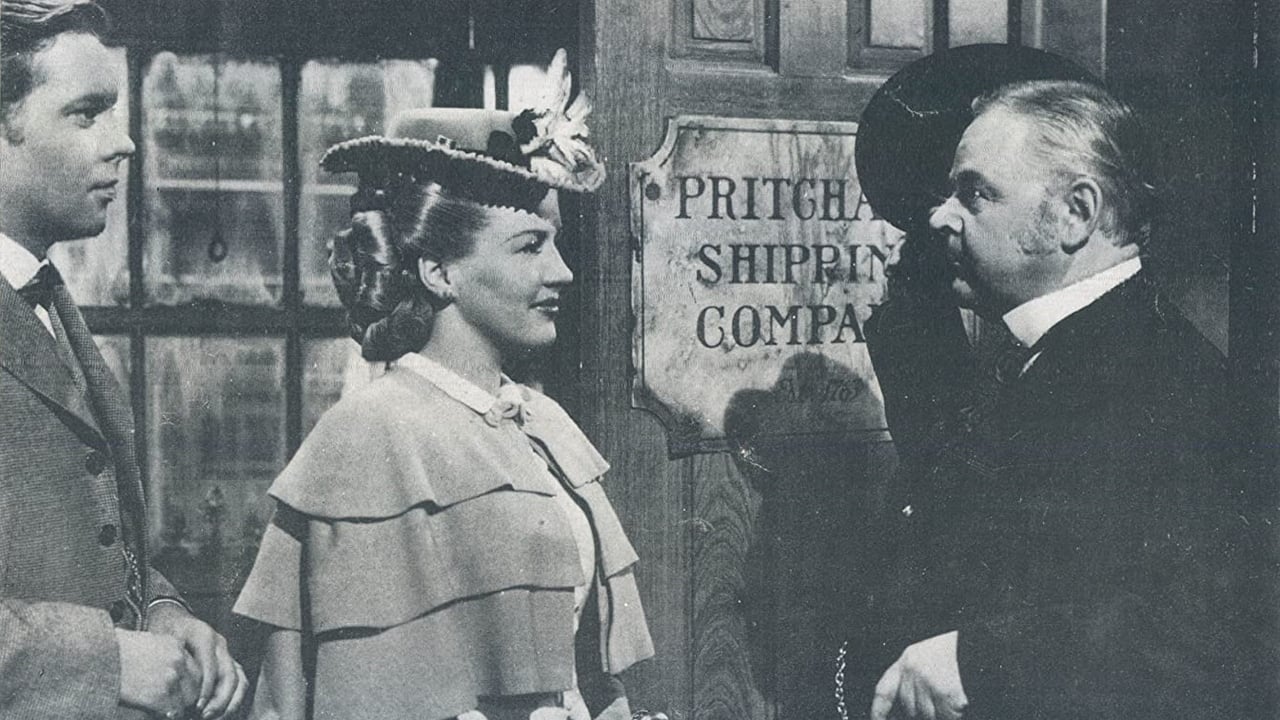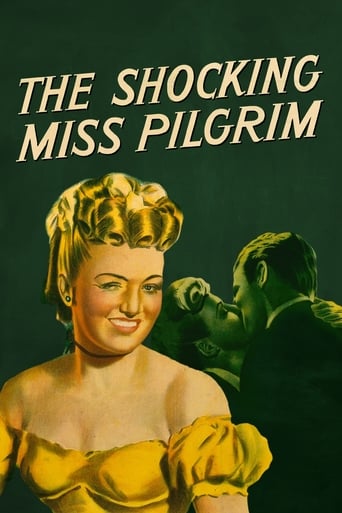

The movie's neither hopeful in contrived ways, nor hopeless in different contrived ways. Somehow it manages to be wonderful
... View MoreGreat story, amazing characters, superb action, enthralling cinematography. Yes, this is something I am glad I spent money on.
... View MoreThe joyful confection is coated in a sparkly gloss, bright enough to gleam from the darkest, most cynical corners.
... View MoreOne of the film's great tricks is that, for a time, you think it will go down a rabbit hole of unrealistic glorification.
... View MoreWomen dressed like men in the suffrage meeting. Women band members. Haymes' aunt beautifully dressed, but tough and strong personality mesmerized others. Betty dressed very femininely, and even showed the ankle part of her beautiful legs when Haymes was nearby glaring wolfishly.Pilgrim, Peabody, Quincy. Boston New England names. Too much hatred of Boston, though. It would lose the Boston audience. Too insulting. There was no movie code against that kind of "ism".Haymes was a beautiful singer. I also enjoyed him in the movie State Fair.Type Writer became typist. Today, people type on smart phones and tablets. We no longer roll the paper into the platen. Today, also, women aspire to bachelor's degrees and higher, and not just office jobs. In the time portrayed in this movie, Betty's new profession was an uncomfortable situation and threatening to a lot of sexist men.Betty was actually valedictorian over a bunch of men, who comprised most of the graduating class.Miss is now Ms. Betty is still famous, and most people I would think never heard of Haymes.I was looking for the movie about the woman Type Writer, thinking it starred Ginger Rogers, but I think that that movie was called The First Traveling Saleswoman, about a woman who sold corsets also in the same Gilded-Age time period of this movie The Shocking Miss Pilgrim.1874 time period of this movie. American women got the right to vote in 1920. That was 46 years later. 1848 the American women's movement began with Elizabeth Cady Stanton and Lucretia Mott. That was a long, long way, Baby, to 1920. Women, go out to vote next week. Don't stay home. Every time you stay home away from the voting booth, there is still some man out there who is happy you kept your intelligent voice out of the political arena.This was a post World War Two movie, where many women had been Rosie the Riveter. The work world was no longer a stranger. It must have been amusing for women to see Betty conquering the all-male enclave, back in 1874.I did like the singing of Betty, in this movie, plus Haymes also.
... View MoreThe Shocking Miss Pilgrim was born when Ira Gershwin might have been doing some spring cleaning and came on some old unpublished music of his late brother George. From that both a score came and a movie for that score, The Shocking Miss Pilgrim who shocked Boston by becoming a professional woman, a Type Writer.Betty Grable is in the title role and she's graduated from a secretarial school in New York and she gets assigned to Boston to a shipping firm headed by Dick Haymes. Haymes is a proper Bostonian of the time and believes the woman's place is in the home. Eventually he'd like to see Grable in his home, but not in the office. When he tries to reject her, his sister suffragette Anne Revere interferes and Betty starts a career there on this newfangled machine called a typewriter.As the first one in Boston, a city loath to break any traditions she's a hero to the women's suffrage movement, not something Dick is ready to deal with. Of course it all works out in the end and in a most peculiar manner too.Of these trunk songs that Ira Gershwin developed for the film, For You For Me Forevermore and Aren't You Kind Of Glad We Did became posthumous hits for brother George. Both are duets in the film sung by Grable and Haymes. Dick recorded them for Decca with his usual singing partner Helen Forrest, but Betty as per Darryl Zanuck's ban on his stars recording never put these down on wax. A pity too, they're both presented quite nicely.The Shocking Miss Pilgrim got very good reviews but did not do well at the box office. Grable's fortune was her legs and we got barely a glimpse of them in this film.Fortunately we can still enjoy a musical literally born in a trunk.
... View MoreLong before they were referred to as "secretaries", "girl Friday's", "administrative assistants" or even "typists", those who worked on those new fangled writing machines were simply called "typewriters". Graduating from a New York typewriters school, valedictorian Betty Grable is sent to Boston where she is informed by her new boss that he (Dick Haymes) expected a man. Fortunately, he has a suffragette aunt (Anne Revere) who has controlling interest in the firm, and that gets Grable the job. Now if she can just get her boss's respect, prevent office manager Gene Reynolds from sneering at her, and find a suitable place to live where a "typewriter" who happens to be a woman isn't confused for being a Jezebel, she'll make it just fine.And fine she does make it. She moves in to the boarding house of a bunch of self-acknowledged outcasts, run by rebellious Boston socialite Elizabeth Patterson who was ostracized for her unconventional ways. When Haymes attends a suffragette meeting with her, the stage is set for a romance between the two, even though that is against "rule #6". Grable expects his socialite mother (Elisabeth Risdon) to be a judgmental snob and prepares a series of society aimed insults for her with amusing results. Miss Pilgrim is an instant Boston celebrity, loathed by some and loved by others, and when the line-up of suffragettes and their few male supporters are revealed, the visual result is hysterical, featuring a few whom in 1894 were obviously of the "love that not reveal its name" category. (Films after the production code came in rarely showed obviously gay or lesbian characters, and this is one of the few).I wish there was less of the romance (featuring some unknown George Gershwin music that his brother Ira wrote new lyrics for) and more of the office setting and suffragette plot. That is more interesting, although the "scissors"/"knives" reference is truly hysterical and gives the impression that even if these two do get together, there will be no "pants wearing" in this family: it will be a marriage of equality-or else!I felt sorry for Gene Reynolds here, typecast in his usual prickly fat man role of a chauvinist fool. But for Revere and Risdon, I really wanted to see more of them. As sisters-in-law in the film, they never even appear together, a loss for the script. Patterson and her band of delightful eccentrics add some needed comedy which includes a transaction between three of the tenants simply to feed their egos. A woman resident of Patterson's house who has been working on re-writing the dictionary wouldn't be out of place in this new rhetoric world where the English language has all but disappeared together.
... View More"The Schocking Miss Pilgrim" a curiosity piece rarely seen these days. The film focus on the early women's right movement in the late 19th Century. Some of the ideas from that time still resonate these days, although there is no comparison. Director George Seaton delivers an entertainment movie that is enhanced by some unheard music by George and Ira Gershwin that is a delight to the ear.Betty Grable, a charismatic actress, portrays Cynthia Pilgrim, who has just finished a sort of secretarial school in which the use of the typewriter by a female was a breakthrough. Ms. Pilgrim is assigned to Boston where she is the first woman employed by a solid old firm that only employs male personnel. Soon Cynthia changes the perception of the office about women in the work place, winning the heart of her boss John Pritchard.The musical numbers are delightful without being flashy. Ms. Grable and Dick Haymes make some nice music together. Mr. Haymes with his melodic voice is one of the best things in the film. Also, Anne Revere and Gene Lockhart do excellent work in minor roles.This film should be seen more often because of the charismatic Ms. Grable and her costar Dick Haymes.
... View More